Nav Jivan Hospital
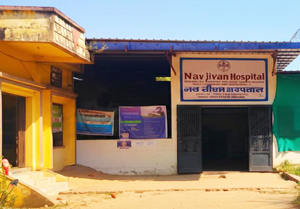
Riya had been unconscious for two days before she was brought to Nav Jivan Hospital (NJH). She had been suffering from abdominal pain earlier, so X-rays and then a laparotomy were performed.
The NJH medical team found a rupture in her small intestine, so emergency surgery was performed. For five days there was no improvement in Riya’s condition, but the staff encouraged her family not to give up. On the sixth day, against all odds, she opened her eyes.
Riya needed 12 more days of ICU care followed by 2 weeks of rehabilitation. After almost a month’s stay in the hospital, she walked home to see her 2 young, excited children. The NJH staff rejoiced at her healing and her reunion with her family.
Snakebitten in His Sleep

Jitender had no recordable pulse or blood pressure when he was brought in to Nav Jivan Hospital. Only 8 years old, Jitender had been bitten by a poisonous snake in his sleep.
The medical team jumped into action and gave Jitender 20 vials of anti-snake venom (ASV). For 7 days they kept him on a ventilator because he could not breathe on his own. During this time, Jitender’s parents wanted to give up and take him home, saying they were not able to pay for his treatment. The doctors counseled the parents and convinced them to keep Jitender in the hospital. Normally, Indian families provide food for their hospitalized patient, but in this case, the staff took care of their needs because they were too poor. The doctors and nurses continued to pray and care for Jitender.
On his own, Jitender’s father requested the opportunity to work around the hospital to help pay their bill. Additionally, one of the doctors arranged for some funds toward his treatment. By God’s grace, enough money came in for Nav Jivan to cover the entire bill and bring relief to the parents.
Meanwhile, Jitender slowly recovered and received a second chance at life. In gratefulness, his father continues to work around the hospital and attend the daily prayer times. The efforts of the dedicated Nav Jivan staff will have a lifelong impact on this family.
The Importance of Being Home for Dinner
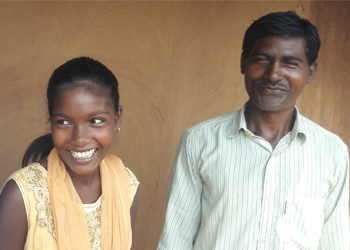
Ashok Singh was a single dad and was doing the best he could. His wife had died in 2009, and he was trying to provide for and raise his three children. Then he heard about the parenting class run by Nav Jivan Hospital staff and held in the village of Pholwaria, and he decided to attend. His 14-year-old daughter, Priyanshu, came with him.
Ashok learned from the curriculum and put some of the ideas into action. Priyanshu now reports that previously her father didn’t spend time with them, missed dinner regularly, and came home very late. Now he spends time with his children and makes sure to be home for supper. Priyanshu is very happy with the changes her dad has made, and she is thankful to the community leaders for the training they provided.
All in all, Nav Jivan Hospital held 9 parents’ groups that included 66 families with a total of 182 members in 9 different villages. The positive changes that will ripple out from these classes will affect generations of families.
Relief from Seizures and Stigma

Madho had suffered from frequent seizures her whole life, and they had left her wounded, scarred, and isolated. When she came in to Nav Jivan Hospital she had numerous infected, malodorous wounds as a result of falling during seizures. Madho’s father explained to the hospital staff about her seizures and treatment history. Nothing had worked. His biggest concern was that since she was “just a girl,” she was expected to contribute to the household work, but Madho could not because of her condition.
The Nav Jivan doctors prescribed anti-seizure medication at a significantly reduced cost. Although skeptical, her family decided to have Madho try the medicine. To their surprise, the seizures were controlled and Madho began to relate in a more healthy way to those around her.
Today Madho not only helps with household chores but also has obtained some part-time work and is helping to provide for her family. She is thrilled to be less isolated and no longer in fear of a seizure taking over her body. The provision of medicine for this young woman has meant so much more to her well-being than just bringing her physical health.
Sickness and Sadness turned to Healing and Hope

Imagine being abandoned by your husband for the simple reason that you were not able to provide a motorcycle as a dowry. That’s the situation that pregnant 26-year-old Soni Kumari found herself in. She arrived at Nav Jivan Hospital with complaints of a cough and breathlessness. Soni had no money to pay a hospital bill, but she was admitted to the critical care department.
The hospital did not have the diagnostic equipment to make a definite diagnosis, but the staff began treating Soni with oxygen. Due to finances, they had no option to send her to a more advanced facility, so they began to pray fervently for this young woman. Initially, her body began to respond to treatment, but then depression took over and she no longer wanted hospital care. She wanted to die.
There was nothing more the hospital staff could do to help her; it was in God’s hands. But in the next few days, there was a significant improvement in her attitude and compliance toward treatment. From that point on, Soni grew better. After three weeks, she was discharged but continued to have prenatal checkups. When the time came, she delivered a healthy baby boy with no complications. All the hospital staff were thrilled at her recovery and the safe delivery of her baby, all thanks to God.
Freedom to Walk and Run


Children in India face many difficulties that most American children do not experience—everything from lack of food and medical care to sub-par education to pressure to help provide income for their families. Children who are born with disabilities really have the odds stacked against them. Not only do they have to learn to work around their difficulties physically, they are usually neglected and socially ostracized.
Little Anisha was three years old and still unable to walk. She had been born with clubfoot, and her foot was turned so far inward it would not support her weight. The first doctor who examined her told her parents that she would need surgery costing over $2,300 dollars—an astronomical sum for this poor family. Her father responded by taking on extra work to try and raise the money.
Then Nav Jivan Hospital’s Community Based Rehabilitation Project team heard about Anisha. They had begun coming alongside 600 people with disabilities (PWDs) in the Palamu and Latehar Districts to empower them and improve their quality of life. This project works with children with various impairments, providing patient assessments, therapy, assistive devices, and parent support.
When the community coordinator of the project met Anisha’s family, he began to establish a relationship with them and look into possible Cure Clubfoot services that they could access in nearby Ranchi. Eventually Anisha was taken to Ranchi for a doctor’s examination. The doctor said her condition could be treated by a series of casts rather than surgery. The first plastering was done that very day.
The family had to travel to Ranchi every week for five weeks straight for Anisha’s leg to be replastered. It was not an easy journey for them as it required time off from work and funds to travel. But they persevered with encouragement from project staff, and eventually Anisha was done with casting and given shoes to wear. They were not comfortable at first, but as her body adjusted to the changes, she began to take her first steps, and then walk confidently, and finally run freely. She can now be found running and shouting for her mother to watch her. Her mother doesn’t mind; she is thrilled to watch her daughter finally walk and run. Thanks to EHA’s community project Anisha has a bright future full of freedom ahead of her.
Coincidence or God’s Plans?

Sometimes people ask EHA staff how they can stand to serve in such remote locations—far away from shopping, family, and medical specialists. Recently Dr. Jeevan Kuruvilla and his wife, Angel, experienced a situation where they could clearly see God’s hand involved in meeting their family’s needs—even in “the middle of nowhere.”
Their two-year-old daughter, Hesed, jumped off her bunk bed and injured her elbow, forearm, and hand. The nearest orthopedic doctor was far away and did not deal with such injuries. The family was traveling to Ranchi, a larger city, the next day. Jeevan thought to call his friend, Dr. Kenny David, who is an orthopedician at the Christian Medical College in Vellore, 1,000 miles away. Miraculously, Dr. David was visiting near Ranchi and was able to examine Hesed and get her treated.
Looking at this situation from the viewpoint of chance… Jeevan’s family visits Ranchi only once in every three to four months. Dr. David comes to Ranchi about once a year. The chances of one of Jeevan’s family members injuring her elbow is maybe once in a generation. And to have all of these events occur simultaneously in such a way that Hesed received a consultation from the pediatric orthopedician of a premier heathcare institution in the country… all while Jeevan was stationed in a remote corner of the country—it’s amazing!
Jeevan and Angel are convinced that God used this situation to show them His care for them.
Struggling to Breathe

Snakebite is just one of many medical conditions that makes breathing difficult if not impossible. But it is one of the more deadly. Recently, two patients with poisonous viper bites came to Nav Jivan Hospital for treatment. Despite anti-snake venom being administered and the patients being ventilated, they both died. What they really needed was high pressure ventilation, but there is no full-fledged adult ventilator for 200 km in any direction. This means that 5 million people do not have access to high pressure ventilation when they need it. A low-end adult ventilator costs $9,450, an enormous sum for a missionary hospital. If you would like to contribute to this need, go to our donation page and click on Nav Jivan Hospital in the drop-down menu.
A successful ventilation story deals with a father and son who came down with cerebral malaria. The son, Mr. P, came in first. His situation was so dire the staff did not expect him to survive. When they began to intubate him, they found a piece of turmeric wedged in his throat. Apparently his relatives had put the turmeric in between his teeth during a seizure. It was almost fatal. After being on the ventilator for two days, he made a remarkable recovery. Then his father, Mr. R, was also diagnosed with malaria and put on the ventilator. He, too, made a successful recovery. The staff was thankful that their old ventilator was adequate to save these two men’s lives.
Medical Camp Treats Many
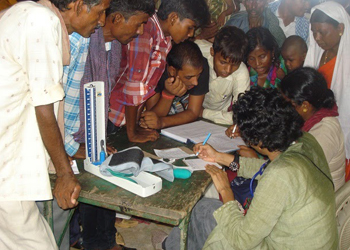

Many EHA hospitals have begun networking with other like-minded non-governmental agencies, churches, and para-church organizations to provide medical care for those in need. The same is true of Nav Jivan Hospital. Recently, two doctors and ten staff people from NJH teamed up with Calvary Gospel Mission and Wycliffe Bible Translators to hold a medical camp in an area called Panki. Amazingly, they treated over 350 patients. The needs are overwhelming, but EHA is working to meet them, one camp at at time.
Choosing Between Healthcare and Home
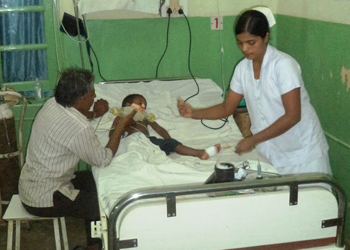
There were no regrets and no recriminations, even though his family was now destitute. All he expressed to the EHA doctor was thankfulness at saving his daughter’s life.
It all began when a nine-year-old girl was brought to Nav Jivan Hospital. She was found to have a perforated intestine, probably the result of enteric fever. The treatment, which included surgery, proceeded without incident. Their total bill came to about 12,000 rupees ($218), and it looked to the hospital staff as if the family was not too poor to be able to afford the bill, so they did not inquire if financial assistance was needed. Since there were no complications and the admission period was uneventful, the staff did not remember much about this girl and her family.
Not until six months later, when a doctor traveled to set up a TB clinic 100 miles away from the hospital. Traveling by jeep, he stopped at a wayside shack for tea in the early morning hours. A middle-aged man came out of the shop and touched the doctor’s feet, saying that this doctor had saved his daughter’s life. The doctor could not place this man until the daughter came running out from behind the shack.
The shack was constructed from four heavy pieces of wood, one in each corner. To these were hung plastic sheets and sack cloth, dividing the space into three rooms. Haphazardly arranged bricks formed the outer walls.
The doctor was surprised at the severe poverty in which the family lived. As he sipped the tea on that cold winter morning, he asked the father how he was able to pay the hospital bill six months previously. He was in for a shock.
The father replied that they had seen better times before his daughter fell sick. By the time they brought her to the hospital, they had already spent 20,000 rupees ($360) on her treatment. They had just planted their crops and so had no money with them to pay the bills. They had to take a loan from the local money lender, a notoriously unfair and unwise practice. A monsoon then took out his crops, so they had to sell their home and land to repay the loan. After that, they were forced to live in this little shack. He pointed about 50 meters down the road to a hut, much better than their current residence, and told the doctor that they used to live there before his daughter fell ill.
The doctor was amazed at the family’s thankfulness for their daughter’s good health in light of what it cost them. There was no blame or frustration expressed to the doctor about the fact that they had been dragged into abject poverty in order to pay the hospital bill.
In India, 40 percent of poverty is caused by ill health in the family and the cost of ensuing medical care. It is your gifts that allow EHA doctors and hospitals to drastically reduce the bills of those who truly are unable to pay. For these patients and their families, it isn’t about not being able to afford cable TV or another vacation due to hospital bills. It is about basic survival.
Miraculous Story of Survival

She should have died. Saachi entered Nav Jivan Hospital with severe bleeding and a retained placenta after giving birth elsewhere to a stillborn child. Her hemoglobin level had dropped drastically to 1 gm (normal is around 12 to 16 for adult women). With AB positive blood, it was unlikely the family would be able to find enough blood to keep her alive. One of the hospital staff donated the first pint of blood in faith that God would heal this woman despite her precarious situation.
The doctors’ initial attempt to treat Saachi by removing the placenta was unsuccessful. Eight pints of blood later, her hemoglobin still had reached only 3.2 gm, but her bleeding had stopped and her vitals were all normal. With much prayer, the doctors decided to do a hysterectomy, and as the uterus was gangrenous when removed, this surgery saved her life. It was a long haul for Saachi and her family, but in the end she pulled through and has been released to go home to her husband and two little boys. She and her family are very thankful for God’s hand in healing her. This is an amazing story of perseverance and faith on the part of the Nav Jivan Hospital staff coupled with the grace of God to bring about a miraculous healing in one woman’s life.
Trusting Him

Recently the staff at Nav Jivan Hospital were in a peculiar situation. Since they reside in a highly snake-bite-prone area, they always keep about 40 vials of anti-snake venom (ASV) medication on hand for their staff use. They had a two-week period in which they faced difficulty in obtaining the ASV, and the patients with snakebites just kept coming. One supplier agreed to deliver 120 vials on a Friday and then had to cancel. They had a snake bite victim and had to use 16 of the 40 vials they had in reserve. The supplier confirmed a delivery on Monday, but then the train was cancelled. Dr. Jeevan Kuruvilla scrounged around the local pharmacies and got 5 more vials. The supplier rescheduled for Wednesday, and Jeevan was praying hard that he could get through until then with just a few vials.
Then God sent him a thought: Dinesh, the hospital’s engineer, had traveled to Ranchi, so he contacted him and he was able to obtain 15 vials from various sources. And when a little girl came in the next morning with a severe snakebite, he knew why God had prompted him to get more ASV through Dinesh. She was not breathing at all, so they intubated and mechanically ventilated her. They gave her 8 of the vials immediately and 8 more went in over the next 4 hours. At that point she was conscious and sitting up comfortably. For Jeevan, the incident had a simple message: trust in God alone for your needs.
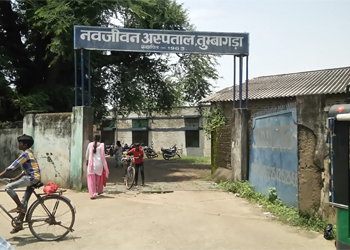
About Nav Jivan Hospital
Begun by Mennonite missionaries in 1961, Nav Jivan Hospital now serves the poor from the Palamau and Latehar districts in Jharkhand. In 1973 they began training village girls in an Auxillary Nurse/Midwife program. As time went on, many services were added according to the needs of the area. Today, this 100-bed hospital treats 35,000 patients yearly in the outpatient department and 5,000 in the inpatient department. Nav Jivan has the only Acute Care Unit in the region. Approximately 1,000 cataract operations are performed every year and over 5,000 patients are seen in the eye outpatient department. People travel from far away to come for dental care—and about 2,000 patients are seen each year. About 3,000 patients receive free TB care yearly. Every year approximately 20 students graduate from the nursing program and go on to serve in various capacities all over the country.
There are several Community Health and Development Projects operated out of Nav Jivan Hospital. One works to reduce the levels of tuberculosis in five blocks of the Palamu district by creating awareness, reducing stigma, and encouraging people to access the healthcare they need. The tribal communities served by this project have a population numbering 500,000. Since 60 percent of these villagers are illiterate, the project often uses films to teach the people about how to access diagnostic and treatment services. They also show these films in tribal schools located in remote places so that teachers become aware of the symptoms and healthcare options to bring this information to their students.
Another project deals with Reproductive and Child Health. The objective of this project is to reduce the gaps in healthcare and facilitate reproductive and child healthcare in the Satbarwa block. Improvement in the areas of immunization, family planning, and antenatal care has been seen. Seeking to make long-term change, project workers teach pregnant mothers to seek routine prenatal checkups and to deliver at a hospital. Through all of these programs and services, Nav Jivan staff seek to share the love of God with those whom they are serving.
